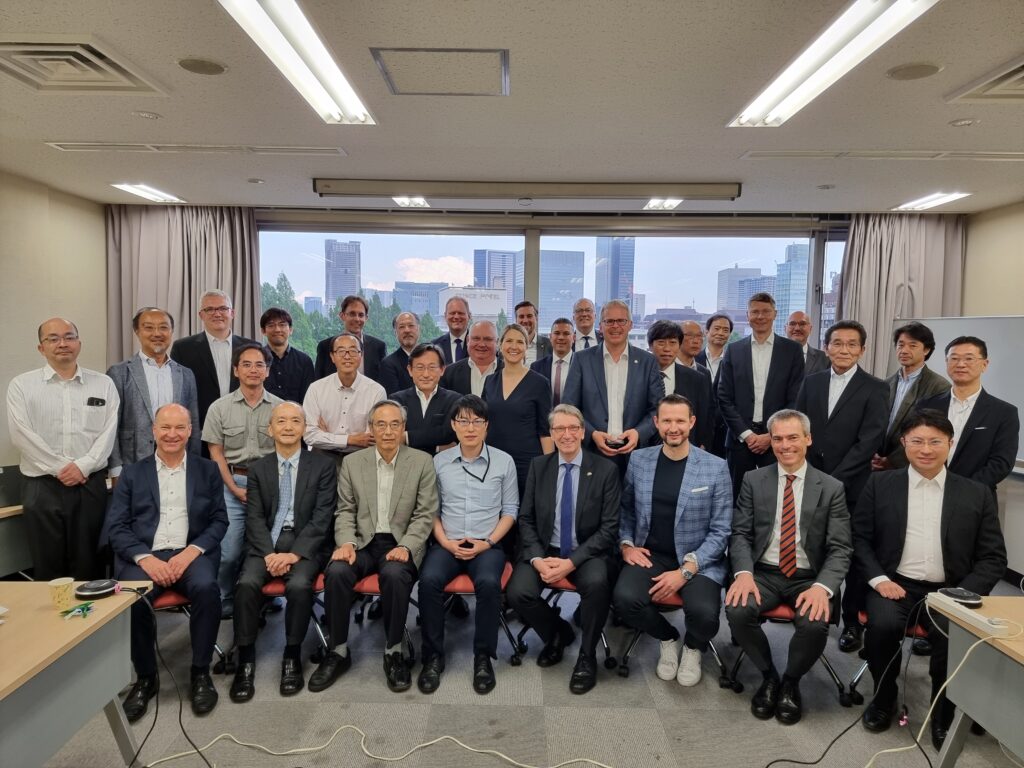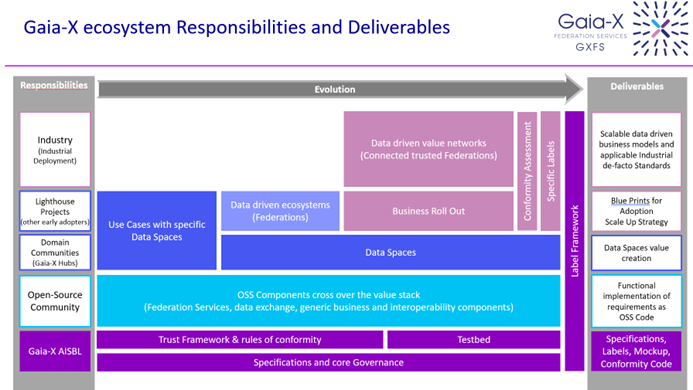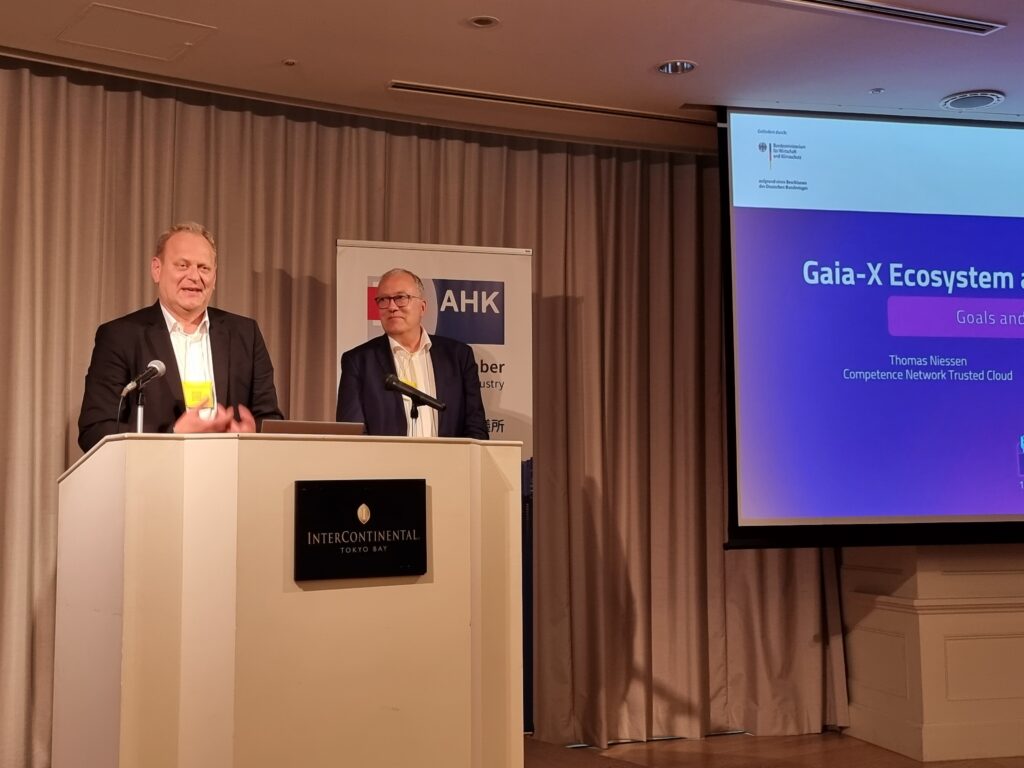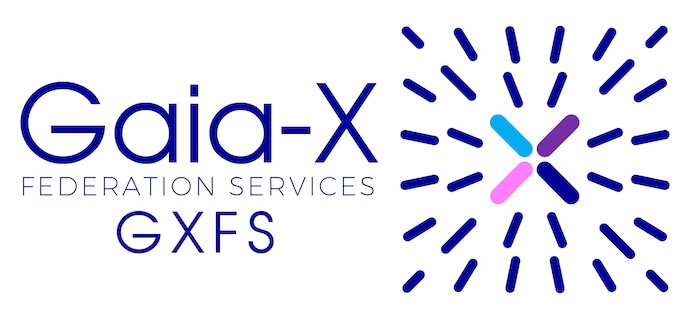
My involvement with Gaia-X has taken me all over Europe. But economies are struggling with the digital transformation – even 9,000 kilometres from Berlin and Brussels. A comparison with an exporting nation that is just as well known for its high-quality industrial products as Germany is revealing. Given the urgency of the problems, our hosts surprised us with open self-criticism. Impressions from the second German-Japanese Industry 4.0 Forum in Tokyo.
June in Japan is like an extra season between spring and summer: The rainy season is already summery warm, but oppressively humid and wet. A time of transition that demands patience from locals and visitors alike. In this respect, the weather also suited the occasion of the second German-Japanese Industry 4.0 Forum in mid-June in Japan’s capital: Currently, both countries, as export-oriented industrial nations, are struggling to digitalise their vital economic sectors. The outcome is open. The meeting was organised on the German side by the Industrie 4.0 platform, the German Federal Ministry for Economic Affairs and Climate Action (BMWK), the German-Japanese Chamber of Commerce and the German Embassy in Tokyo. If one wanted to condense all the topics and discussions of this meeting into a single word, it would be: DATA.
Prosperity is no longer possible without sharing data
Data was a secondary factor in the rise of Japanese and German industries in the 20th century. For the current century, on the other hand, both countries expect that the free flow of data between business partners and economic areas will be as important for prosperity as the exchange of goods itself.
But as the value of the data increases, so does the effort required to protect it. The Japanese fear that growing data protection bureaucracies could weigh on trade volumes and productivity, especially for export-oriented economies. That is why Japan’s then Prime Minister Shinzo Abe presented his concept for “Data Free Flow with Trust” (DFFT) at the World Economic Forum 2019 in Davos. His goal: Not levelling the data protection regimes of different economic regions but making them interoperable. In the same year, the Europeans also launched Gaia-X, their data initiative that aims to create secure and sovereign data spaces on the continent.

“We have underestimated digitalisation!”
Such approaches were also discussed at the first German-Japanese Industry 4.0 Forum in 2019. Then the Covid-19 pandemic brought it all to a standstill. In June, we finally picked up the conversation again – after four years in which we had all pressed the fast-forward button on the digital transformation. Now the need of both countries for connected industrial production with binding rules for data exchange is greater than ever. But progress is slow.
The digital director of a large Japanese corporation put it this way: “We have underestimated digitalisation!” We make sophisticated products, but we don’t connect them.” (A Chief Digital Officer from Japan). I had not expected this openness in Japan, especially in front of their own staff. But it showed me how very aware all participants were of the urgency of the problems.
Scarce resources for transformation
Japan faces particular challenges in this regard:
- At an average of 85 years, only people in San Marino and Monaco live longer than Japanese people.
- Because too few babies are born in the island nation, its population will shrink from 123 million today to 100 million by 2050, partly because policies continue to exclude targeted immigration.
- At the same time, no country in the world is more indebted in relation to its economic output. Debt, rising inflation and interest rates are painfully restricting Japan’s economic policy options.
- Now, of all times, neighbouring China’s hegemonic intentions threaten peace in the region.
As in Germany, Japan’s decades-long peace dividend is coming to an end. The country is running out of power, resources and time for reforms and innovations. The comfort zone of decades of peaceful and prosperous globalisation is fading. This makes it all the more important for both countries to maintain their strengths in a digitalised and more turbulent global economy. What was revealing at the meeting in Tokyo was that Japan and Germany are developing different strategies for this.
Openness at each data point versus national border interconnection points for data
How do Japan and Germany intend to regulate the cross-border exchange of data?

As part of the German delegation, I was able to present our approach together with Thomas Niessen, Managing Director at the Trusted Cloud Competence Network: With Gaia-X and the Gaia-X federation services, we want to create an ecosystem of sovereign data federations that makes data securely accessible at the point of origin – even for business partners abroad. With laws like the Data Act, the European Commission wants to free industrial data from its silos and even break the manufacturers’ data monopolies.

Japan tends to take a domestic view of openness and otherwise focuses on interoperability with foreign data protection regimes. Even in the future, a Japanese company like Mitsubishi Electric will not connect its domestic manufacturing sites directly with data points in Europe. Instead, Japan is taking an indirect approach: Comparable to the border interconnection points between European electricity grids, intermediaries are to collect Japanese industrial data and transmit it in a controlled manner to partners all over the world via central transfer points.
But at this point, the comparison of Germany and Japan no longer fits: In fact, a better comparison is between Japan and the European Union (EU). An EU Member State like Germany strives for a largely open data flow within the EU. When exchanging data with partners outside the Union, the Europeans, like the Japanese, do not want to forego an appropriate level of control. In this respect, our meeting in Tokyo revealed more similarities than differences. In practice, Europe’s and Japan’s solutions will likely be similar.
An alternative development path: Europe is focusing on open source
There is one aspect, however, where we are perhaps one step ahead of our Japanese friends: The diversity and density of contrasts within the EU between members, interests and ideas led us to an alternative innovation strategy. We will certainly not achieve our goals with proprietary solutions in competition with the digital mega-platforms from the USA and China. Our SMEs and even our corporations are too small to each develop technical innovation across the board.
That is why – after initially heated discussions – we are making important technology components for digital sovereignty available to the community as open source solutions. In this way, we pool our resources and create a common technological foundation to which many contribute and on which every company can build. We believe that open source is the best foundation and the most potent engine for federated ecosystems. And perhaps also an approach for Japan, whose financial resources are more strained than ever?
Digital infrastructure for global trade
However we organise digital innovation, one thing was clear to all participants in Tokyo: Global trade needs a new technological foundation! International economic relations will be reflected in new technical infrastructures. A data-based economy needs more than norms and standards to be fully operational. Separate technical ecosystems for data spaces, data federations and data protection regimes are needed, which must be interoperable with each other to varying degrees.
However, the pace of change in recent years shows that we lack the time to develop such ecosystems step by step. Because the journey is so long, we have to take more risks and tackle problems in parallel. In fact, Japan, like the EU states, is still in the conception phase. The first prototypes for data spaces and federations, such as Catena-X or the Service-Meister AI initiative, show what is possible. But here, too, the challenge will be to scale the data spaces from a few experimental data points to tens of thousands.

Sharing our way into the digital future
It will be interesting to see how Japan and Germany shape the digital transformation in the future. As a delegation, we made our contribution by presenting our European projects to the Japanese colleagues and, in return, informing ourselves about the Japanese initiatives. Now it is time to continue and nurture the exchange. My trip to Japan made it emphatically clear to me that digitalisation is given the necessary priority by politicians and business alike in Japan. This is where the impressive discipline of the Japanese becomes apparent. Not only does Japan literally shine with its clean cities. Digitalisation is also approached with the necessary seriousness and dedication.
Andreas Weiss & Thomas Sprenger

Every month on LinkedIn and www.gxfs.eu
Every month, we will guide you through the world of Gaia-X on LinkedIn and www.gxfs.eu. Our analyses and interviews give background and insights into how a European initiative and its collaborators want to create an ecosystem for value creation from data.
Heading this series of articles is Andreas Weiss. As Head of Digital Business Models at eco as well as Director of EuroCloud Deutschland_eco, Andreas Weiss is well connected and familiar with the Internet and cloud industry in Europe. He brings his experience to Gaia-X Federation Services (GXFS), whose project teams are responsible for the development of Gaia-X core technologies. Led by eco, the GXFS-DE project is also funded by the German Federal Ministry of Economic Affairs and Climate Action and is in close exchange with the Gaia-X Association for Data and Cloud (AISBL). Weiss is supported on this blog by Thomas Sprenger, an author and copywriter who has been writing about the digital transformation for twenty years.
